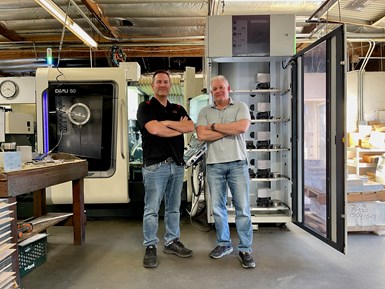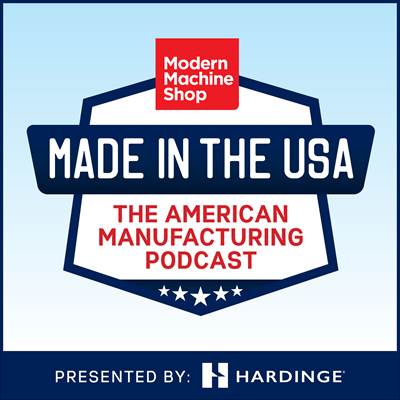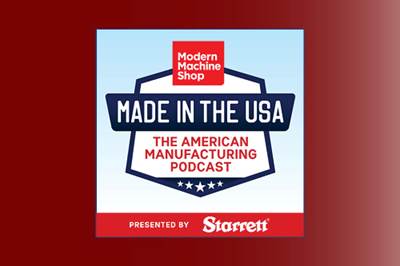There's Your Waste, Shaw! An Argument for Shop Reinvestment
The fictional Don Walling had it right: Innovation and long-term success for machine shops requires investments in technology and people. Not just one, but both.
Share





In the final scene of “Executive Suite” — the 1954 corporate drama about the struggle for power at a large manufacturing company after its 56-year-old president dies suddenly from a stroke — actor William Holden delivers a fiery takedown of corporate greed. Holden plays the young Don Walling, a vice president and design engineer who tries to save the Tredway Corporation from falling into the wrong hands after its president’s unexpected demise. Until the moment of Walling’s blistering speech, the top job seems destined to go to a conniving, profit-driven VP and controller named Loren Shaw — a “human adding machine” willing to compromise the integrity of the company by lowering manufacturing standards to increase shareholder dividends.
During an emergency board meeting where Shaw is on the cusp of being elected Tredway’s new president, Walling lets forth:
“Let's assume, Shaw, that you're the man running the Tredway Corporation your way. Would you be satisfied to measure your life's work by how much you raised the dividend? Is that what you want engraved on your tombstone when you die? The dividend record of the Tredway Corporation? Shaw's right when he says that we have an obligation to our stockholders. But it's a bigger obligation than raising the dividend. We have an obligation to keep this company alive, not just this year, or next, or the year after that. Sometimes you have to use your profits for the growth of the company, not pay them all out in dividends to impress the stockholders with your management record. There's your waste, Shaw! There's your inefficiency! Stop growing and you die! Turn your back on experimentation and planning for tomorrow because they don't contribute to dividends today, and you won't have a tomorrow because there won't be any company!”
If they ever did, the Loren Shaws of the world certainly no longer have the upper hand in today’s manufacturing landscape. In fact, Don Walling’s message to the Tredway board — turn your back on planning for tomorrow and there won’t be one — is more relatable today to Americans than it has been in decades. The writers of this magazine see evidence of Walling’s words play out at machine shops across the country: Innovation and long-term success requires investments in technology and people. Not just one, but both. Employees who take pride in engineering niche solutions to complex problems are those who feel a connection with the company and have the tools, technology and encouragement to innovate.
Much of this came to mind during a recent stop at NC Engineering (NCE) in Gardena, California. I was in the area to visit Productive Robotics (now features in this episode of “Made in the USA”) and stopped at NCE after learning that the company is one of Productive Robotics’ top suppliers. But NCE has its own story to tell, namely that of a second-generation family business that has drastically changed its philosophy towards technology investments in recent years. In fact, the company has completely flipped its conservative strategy for updating its equipment (cash only) to going all-in on lights-out automation. Today, one of the shop’s two DMG MORI DMU-50s five-axis machines is serviced by a 50-pallet-pool Erowa robotic automation center that runs unattended throughout the week. The shop has several HMCs that also run lights-out, including two late-model DMG MORI NHX5000s and a Kitamura HX300iG — all equipped with pallet pool systems and large tool magazines.

(L to R) Gerald Fazis and Patrick Mason, vice president and president of NC Engineering in Gardena, California, pose in front the shop’s Erowa automation center and DMG Mori DMU-50 five-axis machine. The shop was founded by Gerald’s father in 1972. Photo Credit: MMS
The shop was founded in 1972 by the father of Gerald Fazis, who today serves as vice president alongside Patrick Mason, president of the company as well as Gerald’s brother-in-law. Gerald explained that it wasn’t until two back-to-back investments in horizontal machines in 2015 that the company had ever taken out a loan. But the return on investment on these machines has been undeniable. Its $140,000 Erowa system paid for itself within two years. The shop’s consistent engagement with new technologies (not to mention its higher-than-average pay) also maintains the interest of employees, keeping the turnover rate low. Stay tuned for an upcoming article about NCE by associate editor Nate Fields.
In the meantime, we’ve put together a host of new feature stories that I encourage you to dig into right now. Senior editor Julia Hider dives into machine monitoring trends and one shop’s mission to become “the most automated shop in the world.” Associate editor Evan Doran explains how an employee stock ownership plan allowed Astro Machine Works to not only maintain its employee base, but also retain its culture and identity through a change in ownership. And in this month’s cover feature, Nate Fields tells the story of how one shop’s quest for a new automation solution led to the creation of an entirely new company, VersaBuilt.
Finally, we have two new columnists joining Modern’s bullpen this month, both longtime friends of the magazine. Be sure to check out “Cutting-Edge Perspectives” by our friend Dr. Tony Schmitz, and “Industry Insights” by friend and longtime contributor Udo Jahn. These columns will rotate monthly, but we’re kicking things off with a double shot of both Udo and Tony in the March print edition. Hope you enjoy.
Read Next
Team Unity – the Tightrope Walk for Corporate Culture
Finding your place in an organization doesn’t always mean falling in line. But creating a culture of continuous improvement means fostering unity among independent thinkers.
Read MoreMade in the USA: A New Podcast from Modern Machine Shop
The podcast series explores the current state of American manufacturing.
Read MoreAn American Manufacturing Story
For manufacturers that choose to move or keep production in the United States, what are the challenges and opportunities that motivate them?
Read More

















.png;maxWidth=300;quality=90)








.png;maxWidth=970;quality=90)